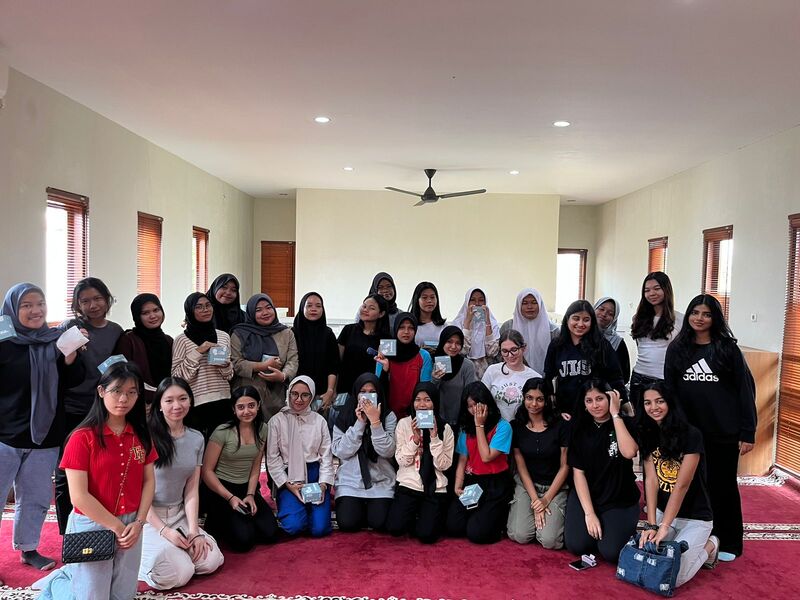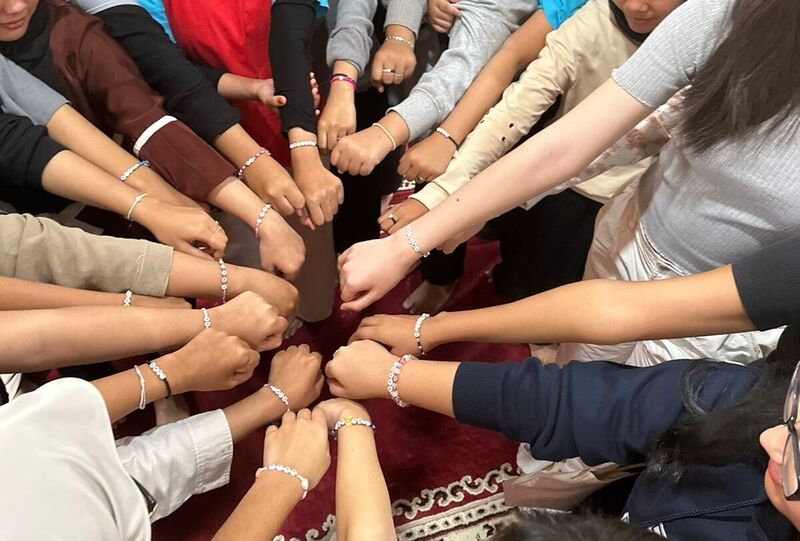Written by B. Anderson – A. Singh – R. Kasliwal – A. Hengstenberg (students of Jakarta Intercultural School)
An exploration of the harsh realities of Indonesian period poverty and the organisations fighting to end it.
From common phrases such as “it’s that time of the month” or “it’s shark week,” subtle hints that menstruation is only to be regarded in hushed and unclever euphemisms have been weaved into more progressive cultures. However, in areas of the world where resources are scarce and beliefs are antiquated, young girls endure much less subtle oppression “when their Aunt Flo comes to visit”.
For many girls in rural areas of Indonesia, “period poverty” runs rampant. Defined as a lack of access to menstrual products, health, and education, period poverty is a direct result of generational stigma, gender discrimination, and religious-based hesitancy. It is essential that these women are connected with the necessary aid, and this starts from the city outward. XSProject is a Jakarta-based, non-profit organisation that works to empower the lives of underprivileged families in Indonesia. In collaboration with JIS High School initiative Code Red, they tackle this crisis head-on, providing impacted women with the education and resources they need.
During a visit to XSProject, Code Red interviewed girls, ages 14-22 to dive deeper into their experiences with period poverty — a phenomenon that highlights the disparity between widespread occurrence and individual experience, challenging the notion of universality in such instances. Limited access to facts about menstruation and insufficient access to menstrual hygiene products create entrenched barriers, most significantly, increasing school drop-out rates. The gender disparity within educational institutes — the embarrassment of having to change your sanitary pads or the inadequacy of menstrual products — can lead to a higher percentage of girls being absent from school, consequently leading to a significant educational disparity between girls and boys in Indonesia. Of the women Code Red interviewed, most girls reported missing school due to intense cramps and the “emotional exhaustion” inevitable with menstruation but also confronting the embarrassment and social pressures regarding “that time of the month”. 
Gender discrimination plays a significant role in period poverty. Periods are regarded, if regarded at all, as “dirty” or “haram” — something men should avoid. Accordingly, many of the young women interviewed noted their inability to discuss their menstruation with their fathers or male classmates, despite its profound impact on their daily lives.
A popularised myth in many societies, for example, is that tampons lead to the loss of virginity. This myth, in addition to the absence of traditional period products, leads many girls to resort to using leaves, wads of newspaper, old clothes, sand, and even ash as absorbent materials. Many perils come along with this scarcity and poor menstrual hygiene, such as urinary tract infections, infertility, and complications during childbirth. Such significant health problems are left widely unaddressed, exacerbating gender inequalities throughout the country.
This stigma is perpetuated by unawareness — unawareness that is not expected to end anytime soon. According to a study conducted by UNICEF Indonesia, “ 25% of adolescent girls had not discussed menstruation with anyone before first menses, and 17% were not aware that menstruation was a physical sign of puberty.” The Code Red interviewees detailed similar information: 50% of the young women reported being unaware of their menstrual cycle prior to their first period, and the remaining half claimed that they had only been made aware by their peers, not educational programs or parents.
According to the National Library of Medicine, over 35% of the world’s population lacks basic menstrual necessities, and it is clear that the impacts of such scarcity run deep. By enlightening the women not fortunate enough to have the same resources others are blessed with, we are not only passing on knowledge but also showing them the importance of making menstruation an open discussion for everyone.
This is the primary mission of Code Red, a student-initiated service club that aims to educate girls in Jakarta on menstrual health, combat period poverty, and provide access to effective hygiene products by partnering up with organisations that share the same goal. We strive to teach the importance and normality of menstruation to girls of all ages while also taking cultural backgrounds and personal comfort levels into consideration. So far, Code Red has made countless service visits to XSProject, distributing sanitary pads to all the girls present. The pads were sponsored by Yoona, a female wellness company that provides accessible and sustainable menstrual products. During each visit, we aim to learn more about the girls by playing introductory games, making the atmosphere more comfortable and carefree. Slowly but surely, Code Red hopes to educate girls about their bodies, teaching them to love and manage certain aspects of girlhood.
Periods are a part of every woman’s life. It is a sign of good health; it is that sigh of annoyance or that sigh of relief. It is “Hey, can you check me?” It is that unspoken sisterhood of understanding. It unifies women as we deal with the harsh realities of subtle sexism that is not nearly subtle enough. We are connected through this horrifically beautiful experience, month after month. But we must remember that this sort of club women are in looks different for different people. For young girls in Indonesia, their periods are inhibitors of opportunity, keeping them out of school, hunched over their lower abdomen instead of sitting behind a classroom desk. We owe it to them to continue the fight against period poverty — a phenomenon that proves this universal occurrence is far from a universal experience. Then again, we all are just “surfing that crimson wave”.




